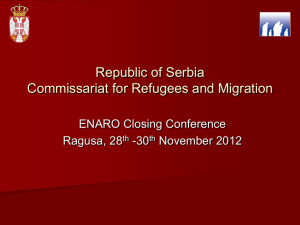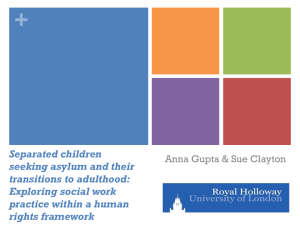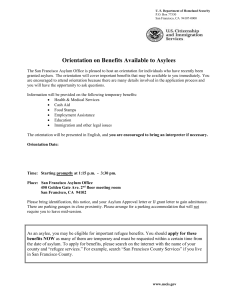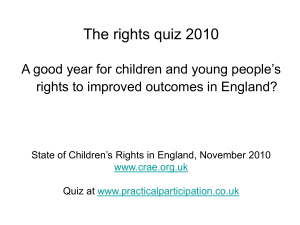original summary - EDAL | European Database of
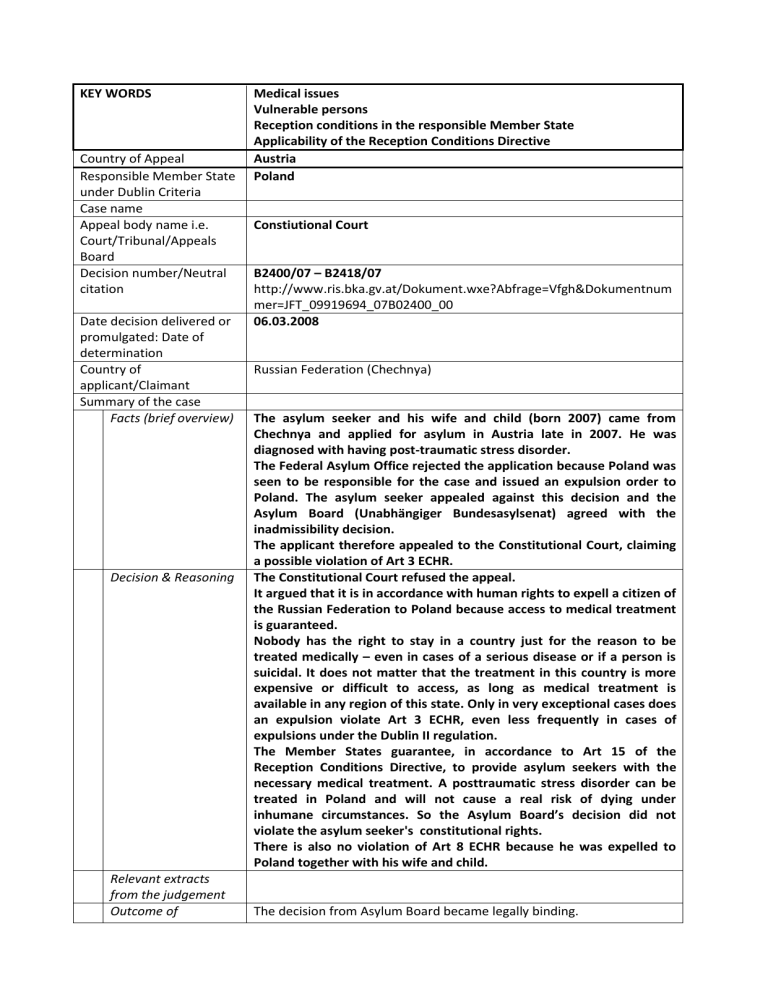
KEY WORDS Medical issues
Vulnerable persons
Reception conditions in the responsible Member State
Applicability of the Reception Conditions Directive
Austria Country of Appeal
Responsible Member State under Dublin Criteria
Case name
Poland
Appeal body name i.e.
Court/Tribunal/Appeals
Board
Decision number/Neutral citation
Constiutional Court
B2400/07 – B2418/07 http://www.ris.bka.gv.at/Dokument.wxe?Abfrage=Vfgh&Dokumentnum mer=JFT_09919694_07B02400_00
06.03.2008 Date decision delivered or promulgated: Date of determination
Country of applicant/Claimant
Summary of the case
Russian Federation (Chechnya)
Facts (brief overview) The asylum seeker and his wife and child (born 2007) came from
Chechnya and applied for asylum in Austria late in 2007. He was diagnosed with having post-traumatic stress disorder.
The Federal Asylum Office rejected the application because Poland was seen to be responsible for the case and issued an expulsion order to
Poland. The asylum seeker appealed against this decision and the
Asylum Board (Unabhängiger Bundesasylsenat) agreed with the inadmissibility decision.
The applicant therefore appealed to the Constitutional Court, claiming a possible violation of Art 3 ECHR.
Decision & Reasoning The Constitutional Court refused the appeal.
It argued that it is in accordance with human rights to expell a citizen of the Russian Federation to Poland because access to medical treatment is guaranteed.
Nobody has the right to stay in a country just for the reason to be treated medically – even in cases of a serious disease or if a person is suicidal. It does not matter that the treatment in this country is more expensive or difficult to access, as long as medical treatment is available in any region of this state. Only in very exceptional cases does an expulsion violate Art 3 ECHR, even less frequently in cases of expulsions under the Dublin II regulation.
The Member States guarantee, in accordance to Art 15 of the
Reception Conditions Directive, to provide asylum seekers with the necessary medical treatment. A posttraumatic stress disorder can be treated in Poland and will not cause a real risk of dying under inhumane circumstances. So the Asylum Board’s decision did not violate the asylum seeker's constitutional rights.
There is also no violation of Art 8 ECHR because he was expelled to
Poland together with his wife and child.
Relevant extracts from the judgement
Outcome of The decision from Asylum Board became legally binding.
proceedings
Subsequent Proceedings
Dublin regulation’s legal provisions applicable
Legal provisions cited
(national & international references)
Case law cited
(national & international references)
Other sources cited (NGO reports etc)
Observations/Comments
Legislation
ECHR
Court name
Organization
Articles
Art 3, Art 8
Neutral citation
Reference
Although the Constitutional Court points out that PTSD is not an exceptional medical state that prevents an expulsion, the subsequent jurisdiction of the Asylum Court points out that it is still essential to a.
make the necessary medical examinations to find out if there is a certain medical condition, and if so, which one and b.
to argue reasonably in every case – based on the outcomes of the examinations and the reception conditions in the respective member state – why this is not a violation of Art 3 ECHR
In cases where the Federal Asylum Office does not follow these steps, the Asylum Court tends to return the case and orders these procedural steps and the reasoning to be carried out.
This is still current practice in Austria and has to be part of every procedure, even in cases of an inadmissibility decision.
This decision dates from a time when we did not have an Asylum Court as a second instance in Austria, but an Asylum Board (Unabhängiger
Bundesasylsenat), which then was changed to Asylum Court. At this time, there was also the possibility of appealing to the Administrative
Court. This law changed on 01.07.2008 – since then there is only the possibility to appeal to the Constitutional Court in asylum procedures.
The distinction between an appeal to Constituational Court and an appeal to the Administrative Court is that the Constitutional Court is only responsible for decisions about violations of constituationally guaranteed rights, while the Administrative Court decides about violations of any other law. It is technically possible to appeal to the
Constitutional Court and to have the appeal assigned to the
Administrative Court in case of a rejection by the Constitutional Court.
Before the changes to the asylum law of July 2008, this was also possible in asylum procedures. Through the change of the law, however, direct appeals to the Administrative Court in case of an unfavorable decision by the Asylum Court and applications to assign the appeal to the Administrative Court in case of a rejection by the
Constitutional Court have become impossible.
In any other kind of administrative procedure (which also asylum procedures are in Austria) appeals to the Administrative Court and the
Constitutional Court have to be made following requirements
explained above. If the procedural steps were not taken or the decision is not based on the information provided in the procedure, it can be cancelled and returned to Federal Asylum Office.
Concerning the Constitutional Court’s right to assess the violation of constitutional rights, it has to be mentioned that Austrian constitutional law includes the constitution (B-VG), ECHR and other constituational laws, which also includes further human rights (e.g.
Constitutional Right of Personal Freedom / PersFrG, ...).
The Constitutional Court in Austria is only allowed to assess the points of law based on the information given during the procedure before of the lower authorities. It is not allowed to introduce new facts or circumstances before the Constitutional Court.

